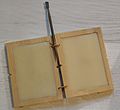Blank slate facts for kids
For the book see here
The idea of a blank slate, also known as tabula rasa (which means the same thing in Latin), is a philosophical concept. It suggests that when humans are born, their minds are like an empty sheet of paper. This means they don't have any built-in knowledge or ideas. Instead, everything they learn comes from their experiences as they grow up.
This idea was made famous by the philosopher John Locke. He believed that all our knowledge comes from our senses – what we see, hear, touch, taste, and smell. Locke wrote:
- "Let us then suppose the mind to be, as we say, white paper void of all characters, without any ideas. How comes it to be furnished? ... To this I answer, in one word, from EXPERIENCE".
This means our minds are filled up by everything we experience in the world.
Contents
Early Supporters of the Blank Slate Idea
Many thinkers agreed with Locke's idea. They believed that a person's character and knowledge are shaped entirely by their environment and upbringing.
For example, the economist and social thinker William Godwin (1756–1836) said that our good and bad habits come from the events in our lives. He thought that if we could remove all bad influences, people would become perfect. He wrote:
- "Children are a sort of raw material put into our hands... [Their minds are] like a sheet of white paper".
Another strong supporter was John B. Watson (1878–1938), who started the field of behaviourism. He believed that he could train any healthy baby to become any type of specialist, like a doctor or an artist, just by controlling their environment. He famously said:
- "Give me a dozen healthy infants, well-formed, and my own specified world to bring them up in and I'll guarantee to take any one at random and train him to become any type of specialist I might select – doctor, lawyer, artist, merchant-chief and, yes, even beggar-man and thief, regardless of his talents, penchants, tendencies, abilities, vocations, and race of his ancestors".
This shows how strongly some people believed that experience alone shaped who we become.
How Science Changed the View
Throughout the 20th century, new scientific discoveries started to challenge the blank slate idea. Fields like evolution and genetics showed that many traits and behaviors are actually inherited.
Ethology, the study of animal behavior, proved that animals have many behaviors that are inherited and instinctual. For example, Konrad Lorenz suggested that human aggression might be an inherited behavior that helped our ancestors survive.
The field of evolutionary psychology also explores how evolution has shaped our minds. If humans share a common evolutionary history with animals, it's likely we inherit some mental traits too. For instance, our ability to learn a language is inherited. Also, our unconscious mind helps us in many ways, and the parts of our brain that do this are certainly inherited.
These scientific findings suggest that while experience is very important, our minds are not completely blank at birth. We come into the world with certain abilities and tendencies that are part of our human nature, shaped by millions of years of evolution.
Related pages
- Adaptive unconscious
- Behaviourism
- Empiricism
- Human nature
- Nature versus nurture
- Psychological nativism
- Sociobiology
- In Spanish: Tabula rasa para niños
Images for kids
-
Roman tabula or wax tablet with stylus
 | Jackie Robinson |
 | Jack Johnson |
 | Althea Gibson |
 | Arthur Ashe |
 | Muhammad Ali |



